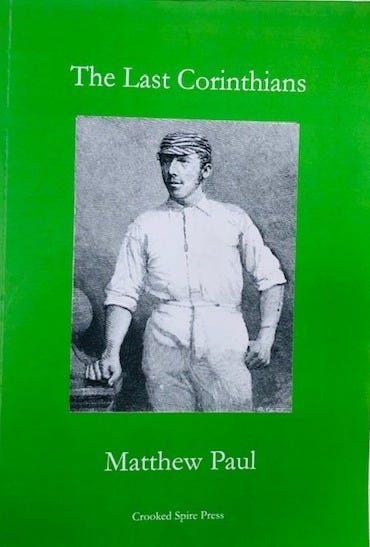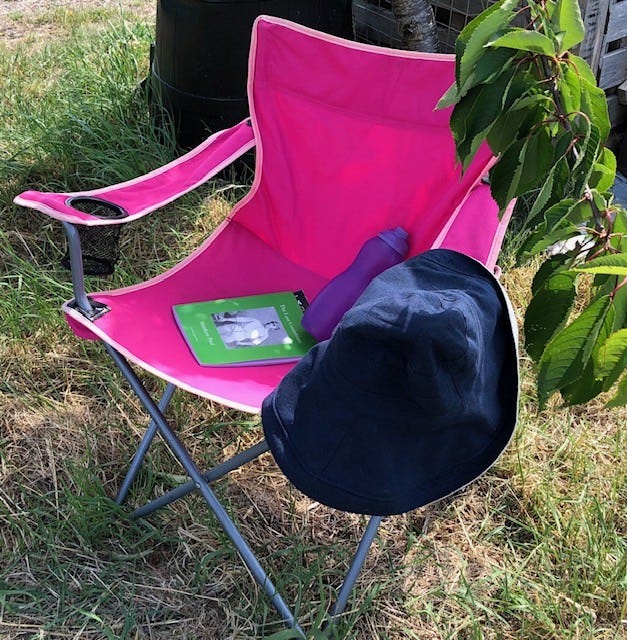Matthew Paul’s second collection, The Last Corinthians, Crooked Spire Press, 2025 follows on from his first, The Evening Entertainment, Eyewear, 2017.
I enjoyed Matthew’s first collection and it’s clear he’s been honing his craft over the last 8 years. In this time he’s moved from London to a more rural life in south Yorkshire and (as the dedication makes clear) lost both parents. So, a different stage of life. There are still quirky, playful poems, as in the previous collection, but a sense of melancholy is more prevalent. The title poem, The Last Corinthians, is a concept I was unaware of (sport not being high on my agenda!). It refers, to a time before sport became a profession and there were players equally skilled in say football and cricket, as well as having a day job.
The poems themselves are divided into three sections. In Part 1, Heydays, expect a host of characters, some familiar from recent history, others forgotten and long gone, but brought back to life vividly in all the strangeness of the past. In Part 2, Black Forest Gateau, there are poems evoking 1970s and 80s popular culture and the experience of growing up in that suburban innocence before the internet took hold, information was instant and we all became addicted to our smart phones. Part 3, Passing Places mainly looks at the poet’s more recent life: the loss of his parents, and his marriage to Lyn, who is named in several poems. Of course, there are outliers that can’t be categorised but fit in with the main themes of nostalgia, loss, and hope for the future.
When I read through the poem titles (eg: The Ballad of Mike Yarwood, Double Chemistry, A Short History of Greenhouses, I was concerned that nostalgia was going to be overwhelming and the poems would be too similar to be interesting. Like those school reunions where you get stuck with that guy who recounts funny incidents from school at great length and with little humour, because for him they were the best days of his life. I can safely say Matthew’s poems are far cleverer, much more entertaining and emotionally sophisticated. At first, I found myself focussing on the pinpoint-accurate historical details and colloquial word choices, but on a second reading, I could appreciate Matthew’s obvious love of language, his skill with rhyme and half rhyme, and his subtle use of form.
Here are my responses to a few of the poems to give you an idea of the subjects and tone of this collection, although any selection is obviously going to be subjective.
In Sofas, what looks like a prosaic, darkly funny subject resolves into something more sinister when we realise the Sofa Workshop in question is built on the site of the infamous 1974 Guildford bombing. Sofa ranges in the present day have names like Previn to half-rhyme with divan; in the 1970s the pub was chocker with flat-capped and tank-topped customers. The ordinariness of drinking, juxtaposed with the horror, is very effective.
Caesarian marks the birth of the poet’s second child. I’m not sure I believe the narrator/poet actually removed all his clothes then put the hospital gown on The ties securing the back too slack/ For the cotton to cover my crack. But the effect is hilarious, like a bad dream. I love the ending when the poet holds up his new son: You crinkled as I lifted you up: Me cock-a-hoop; you the FA Cup. There’s a real sense of pride and a thrill which is very moving.
The contrast in language between Plough Pond (p38) and Entertaining (p39) shows Matthew can successfully use a more traditional ‘poetic’ diction when the poem requires it, and isn’t restricted to 1970s and 80s word choices. These two poems face each other on opposite pages which underlies this distinction. In the first, marsh frogs are tansy-eyed with lime-striped backs and are clamped/in the fumble of joyful amplexus. In the second, we have the epitome of 1970s: skedaddle, for yonks, Campari and lemonade, Double Diamond shandy. If, like me, you grew up at a similar time these words evoke this period brilliantly.
The first section required more work from this reader - like finding old photos of people in strange clothes, involved in ways of life that have been consigned to history. But notes at the end helped to make them memorable. I was particularly drawn to The Walrus Club, a group of swimmers who met before the First World War bulging varsity bathing suits/ on the bladderwracked tideline.
The Last Corinthians is a fine collection from a sophisticated and accomplished poet. I’d recommend it to anyone who enjoys playfulness, a sense of humour and a melancholy nostalgia.
Speaking of nostalgia, I’ve been wallowing in it recently. A vague ache in my hip which I’d noticed over the last year or so has become chronic, making walking difficult. No allotment or yoga. No volunteer gardening or walks with friends. It’s frustrating, so I’ve started physiotherapy which is helping, and been for an X-ray (no results yet, after a whole month!) But I can sit and chat, read, write, sleep and eat; and it’s made me realise I’ve been doing far too much physical stuff. Everyone tells you to do more exercise, but in my case I need to do less. And learn how to REST. In the photo below I’d taken Matthew’s poems to read at my allotment, once I’d finished watering. Now I think I would have been better off cutting out the watering / digging / hoeing and read more. But hopefully it will improve and whatever happens I can enjoy the summer reading!



